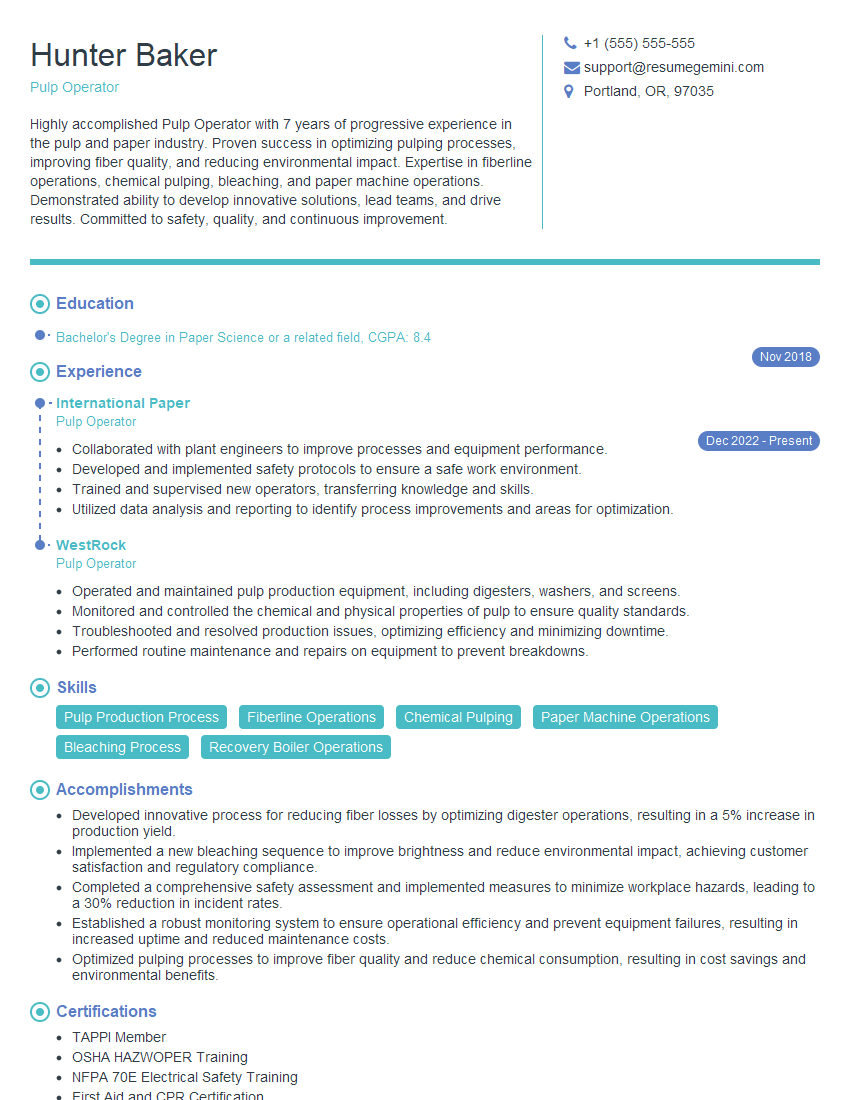Are you a seasoned Pulp Operator seeking a new career path? Discover our professionally built Pulp Operator Resume Template. This time-saving tool provides a solid foundation for your job search. Simply click “Edit Resume” to customize it with your unique experiences and achievements. Customize fonts and colors to match your personal style and increase your chances of landing your dream job. Explore more Resume Templates for additional options.

Hunter Baker
Pulp Operator
Summary
Highly accomplished Pulp Operator with 7 years of progressive experience in the pulp and paper industry. Proven success in optimizing pulping processes, improving fiber quality, and reducing environmental impact. Expertise in fiberline operations, chemical pulping, bleaching, and paper machine operations. Demonstrated ability to develop innovative solutions, lead teams, and drive results. Committed to safety, quality, and continuous improvement.
Education
Bachelor’s Degree in Paper Science or a related field
November 2018
Skills
- Pulp Production Process
- Fiberline Operations
- Chemical Pulping
- Paper Machine Operations
- Bleaching Process
- Recovery Boiler Operations
Work Experience
Pulp Operator
- Collaborated with plant engineers to improve processes and equipment performance.
- Developed and implemented safety protocols to ensure a safe work environment.
- Trained and supervised new operators, transferring knowledge and skills.
- Utilized data analysis and reporting to identify process improvements and areas for optimization.
Pulp Operator
- Operated and maintained pulp production equipment, including digesters, washers, and screens.
- Monitored and controlled the chemical and physical properties of pulp to ensure quality standards.
- Troubleshooted and resolved production issues, optimizing efficiency and minimizing downtime.
- Performed routine maintenance and repairs on equipment to prevent breakdowns.
Accomplishments
- Developed innovative process for reducing fiber losses by optimizing digester operations, resulting in a 5% increase in production yield.
- Implemented a new bleaching sequence to improve brightness and reduce environmental impact, achieving customer satisfaction and regulatory compliance.
- Completed a comprehensive safety assessment and implemented measures to minimize workplace hazards, leading to a 30% reduction in incident rates.
- Established a robust monitoring system to ensure operational efficiency and prevent equipment failures, resulting in increased uptime and reduced maintenance costs.
- Optimized pulping processes to improve fiber quality and reduce chemical consumption, resulting in cost savings and environmental benefits.
Certificates
- TAPPI Member
- OSHA HAZWOPER Training
- NFPA 70E Electrical Safety Training
- First Aid and CPR Certification
Languages
- English
- French
- German
Career Expert Tips:
- Select the ideal resume template to showcase your professional experience effectively.
- Master the art of resume writing to highlight your unique qualifications and achievements.
- Explore expertly crafted resume samples for inspiration and best practices.
- Build your best resume for free this new year with ResumeGemini. Enjoy exclusive discounts on ATS optimized resume templates.
How To Write Resume For Pulp Operator
- Showcase your technical expertise and understanding of pulp production processes
- Highlight your experience in implementing process improvements and achieving results
- Emphasize your commitment to safety and environmental sustainability
- Include quantifiable accomplishments to demonstrate your impact on the organization
- Proofread your resume carefully for any errors in grammar or spelling
Essential Experience Highlights for a Strong Pulp Operator Resume
- Operate and maintain pulp production equipment, including digesters, bleach plants, and recovery boilers
- Monitor and control process variables to ensure optimal pulp quality and production efficiency
- Troubleshoot and resolve operational issues to minimize downtime and maximize production
- Implement process improvements to reduce fiber losses, improve brightness, and reduce chemical consumption
- Conduct safety inspections and implement measures to mitigate risks and ensure a safe work environment
- Train and mentor junior operators and support team members in developing their skills
Frequently Asked Questions (FAQ’s) For Pulp Operator
What is the role of a Pulp Operator?
A Pulp Operator is responsible for operating and maintaining equipment used in the production of paper pulp. They monitor and control process variables to ensure optimal pulp quality and production efficiency, troubleshoot and resolve operational issues, and implement process improvements to reduce costs and environmental impact.
What skills are required to be a successful Pulp Operator?
Successful Pulp Operators typically have a strong understanding of pulp production processes, as well as experience in operating and maintaining pulp production equipment. They are also proficient in troubleshooting and resolving operational issues, and have a commitment to safety and environmental sustainability.
What are the career prospects for Pulp Operators?
Pulp Operators can advance to positions such as Pulp Production Supervisor, Pulp Mill Manager, or Technical Superintendent. With additional education and experience, they may also pursue careers in research and development, or in sales and marketing roles within the pulp and paper industry.
What is the work environment of a Pulp Operator?
Pulp Operators typically work in pulp and paper mills, which can be noisy and have potential hazards such as moving machinery and chemicals. They may work shifts, including nights and weekends, and may be required to work overtime to meet production demands.
What is the salary range for Pulp Operators?
The salary range for Pulp Operators varies depending on their experience, skills, and location. According to Salary.com, the median annual salary for Pulp Operators in the United States is around $65,000.
What are the educational requirements for Pulp Operators?
Most Pulp Operators have a high school diploma or equivalent. Some employers may prefer candidates with a post-secondary degree in a related field, such as paper science or chemical engineering.